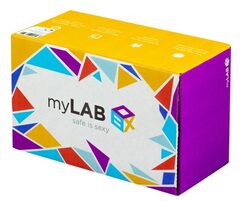Pubic Lice

Symptoms and Treatments of Genital Crabs
By Angie Papple
Genital crabs, also known as Pubic Lice or STD Crabs, are a relatively common - and easily treated - sexually transmitted disease. What sets pubic lice apart from the rest of the sexually transmitted diseases is the fact that they aren't always transmitted sexually. Additionally, you're not considered infected - you're considered infested.
As many as three million Americans contract pubic lice each year. If you think you may have them, don't worry too much; treatment is a simple and painless process.
Do I Have Pubic Lice?
The symptoms are easy to recognize. You may experience intense itching in areas covered by coarse hair, mainly in the pubic region. Sometimes pubic lice migrate - they favor coarse hair, so legs, arms, and armpits may become infested as well. Facial hair, including eyebrows and lashes, may become infested.
When pubic lice bite you, they release a substance on your skin - that's the main cause of itching. You might also notice tiny blue or purple marks where you've already been bitten.
If you see dark spots on your skin or on your underwear, you'll need to see a doctor; those dark spots may be STD crab feces, and you might be prone to an infection from their waste. In this case, you may experience a slight fever and some irritability.
Testing
Note: You can avoid Health Problems if your STI is Detected & Treated.
If you look carefully, you'll see nits clinging to your hair follicles or pubic lice crawling through your hair. Nits are small white or yellow eggs that will be on the hair shaft itself. Adult crabs are very tiny brown or white insects, and they look flat. Older crabs may be light brown or gray.
No matter which physical traits they possess, nothing is supposed to be crawling around down there - so it's safe to assume that you've contracted pubic lice.
Why Are They Called STD Crabs?
When pubic lice reach maturity, they're about the same size as a sesame seed. They've got six legs - and two of them look just like the pincers of a sea crab. You'd have to look through a microscope to see them, though.
How Did I Get Them?
Pubic lice (or STD crabs) aren't always transmitted sexually, although that is their preferred method of transport. If a pubic louse falls off a person, it can still live for up to two days. They could be lingering in bed sheets or the clothing of an infested person.
How Do I Get Rid Of Them?
Check the shelves at your local drug store for a medicated shampoo with permethrin or pyrethrin. (The right box will say something like "1% permethrin lice shampoo.") You'll want to wash and dry the infested area before beginning treatment to improve your chances of total success.
Carefully and thoroughly follow the directions to make sure you get rid of all the pubic lice in one shot.
Once you're done, toss the towel you used to dry off with into the washing machine - and set it to wash with the hottest water possible. You'll need to throw in your bedding and any clothing you may have been wearing, too.
Is Pubic Lice Curable?
Yes, by using non-Prescription OTC (over-the-counter) Products from a local Drug Store or Pharmacy. (CDC)
Conclusion
If you've got pubic lice, it's not the end of the world - but you do need to treat it immediately. You should also warn sexual partners about the infestation and avoid having sex and sharing clothing or bedding with others.
It's possible to kill every last one of them one day and get re-infested the next day, so you've got to be extremely careful to save yourself from having to repeat the process (and risk infection) all over again.
Note: To receive Proper Treatment for STIs, testing is required.
About STD Symptoms
Some people can be Symptomless (No Symptoms) of infection for Days, Months & even Years. Making it difficult to know if you have an STD without Getting Tested.
Also, STDs do have Similar Symptoms so it might be difficult to tell which Individual STD you have contracted. That is why a Panel Test for Multiple STDs is Recommended.
5 Complications of Untreated STIs
- Infertility
- Pregnancy Complications
- Increased Risk of Cancer
- Infection with HIV
See All >>
Related Articles
Could Your Symptoms Signal an STI
Four Simple Ways to Prevent a Cold Sore
See All >>
Products
Featured
Best at-Home STD Test Kit
Test for 8 Common STDs
- Chlamydia | Gonorrhea
- Herpes | Syphilis
- Trichomoniasis
- HIV 1 & HIV 2
- Hepatitis C
No Doctor or Lab Visit
Get Treated if Needed
Order Now >>
 Disclaimer: Articles not intended to Diagnose, Treat, Cure or Prevent Diseases.
Disclaimer: Articles not intended to Diagnose, Treat, Cure or Prevent Diseases.
Infections | Education | Products | Testing


